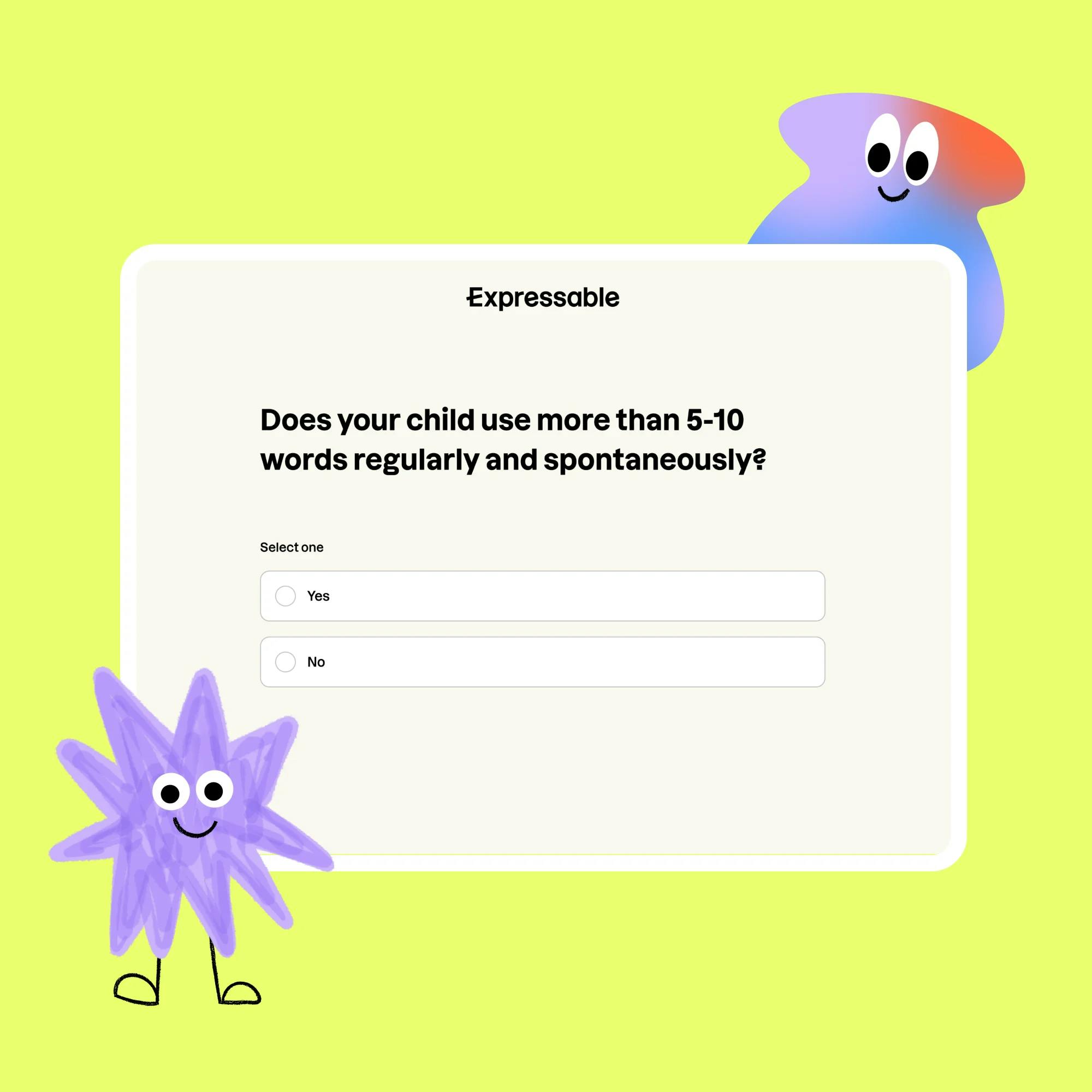There are many different types of communication disorders, and sometimes the symptoms can be similar. That’s why it’s important to understand the symptoms specific to a disorder like apraxia of speech.
This article explains what apraxia of speech is, the main characteristics of apraxia of speech, and what to do if you suspect your child or loved one has this diagnosis. Let’s get started!


What is apraxia of speech?
To produce speech, the brain sends signals to the muscles in the mouth, guiding them to make accurate sounds with a certain speed and rhythm.
Apraxia is a neurological condition that disrupts this process. In apraxia of speech, there is a disconnect between the brain signals and a person’s lip, tongue, and jaw movements. The person often has the language capacity to talk, but the signals from the brain to the muscles are not sent correctly.
In apraxia of speech, there is a disconnect between the brain signals and a person’s mouth movements.
In other words, the brain knows what it wants to say, but it can’t properly plan the speech sound movements needed to say it.
As a result, people with apraxia have difficulty coordinating their mouth to turn sounds into syllables, syllables into words, and words into phrases. It is often hard for people with apraxia to communicate and form clear sounds and sentences. Most commonly, people with apraxia are described as “difficult to understand."


What are the two types of apraxia of speech?
There are two categories of apraxia of speech: childhood apraxia of speech and acquired apraxia of speech.
Childhood apraxia of speech: Most children with apraxia are born with the condition. For children with apraxia, difficulty in planning speech movements is the hallmark of the condition. In fact, the root of the word, “praxis,” means “planned movement.”
Acquired apraxia of speech: This can affect people at all ages, although it most commonly occurs in adults. Acquired apraxia is caused by damage to the parts of the brain involved in speaking, often due to a stroke. It involves the loss or impairment of existing speech abilities.
Main symptoms of apraxia of speech
Every person with apraxia is different, and symptoms can vary dramatically. There are typically several symptoms of apraxia, not just one primary symptom.
In some cases, apraxia can be mild. People may only have difficulty with a few speech sounds or with pronouncing multisyllable words. In more severe cases, a person may not be able to communicate effectively by speaking.
However, most people with apraxia have some of the following symptoms or speech characteristics:
Inconsistent errors in speech: A child with apraxia may pronounce the same word differently each time they say it. For example, one day they may say a difficult word correctly, but soon after they have trouble repeating it.
Distorting sounds: Because people with apraxia do not place their mouth muscles in the right places, sounds often come out incorrectly. Pronouncing vowels can be especially difficult, as can longer and more complex words.
Groping for sounds: People with apraxia can seem like they’re “groping” for words with their mouth. They may try saying a word several times before they say it correctly.
Inappropriate intonation, stress, or rhythm of words: Individuals may struggle with the rhythm and flow of speech. They may segment syllables in a word, omit syllables in words and phrases altogether, or pause inappropriately while speaking.
Other warning signs of childhood apraxia of speech
Some additional symptoms of childhood apraxia of speech that parents should look for include:
Your child says their first words or sounds later than is typical
Limited babbling
Excessive movements of the mouth
Persistent or frequent regression in the number of words produced–so, your child may begin saying fewer words than they used to
Correct use of automatic words or phrases (such as saying "thank you" or reciting the alphabet), but difficulty with voluntary speech
Errors in the order of sound production in words, which can include omitting, switching, or adding to the sounds of words


According to the Mayo Clinic, apraxia in children has been associated with other problems that affect the ability to communicate. While these are not due to childhood apraxia of speech, in many cases they’re observed alongside apraxia, including:
Delayed language development, such as difficulty understanding speech, having a reduced vocabulary, or using incorrect or inconsistent grammar when stringing words into sentences
Delays in reading, spelling, or writing
Difficulties with gross and fine motor skills and coordination
Hypersensitivity–for example, your child may not like certain textures in clothing or food, or may not like brushing their teeth


How to get started with speech therapy for apraxia
It’s important to find a speech therapist who has experience with apraxia of speech. There are several ways you can find an apraxia-specialized speech therapist. The first is to reach out to any friends or acquaintances who have firsthand experience with speech therapy. Word-of-mouth recommendations are always helpful. You can also contact your pediatrician or doctor. They likely have a list of speech therapists that they recommend.
For any speech therapist you’re considering, call their office and ask about their background in treating apraxia of speech. While apraxia is within the scope of practice for all speech therapists, some therapists have more experience than others in this area. Search for online reviews of the speech therapist as well.
While apraxia is within the scope of practice for all speech therapists, some have more experience than others in this area.
Apraxia Kids offers an online registry of speech therapists across the United States and Canada who have experience treating childhood apraxia of speech. You can search by location to find a speech therapist near you.
Be sure to consider the logistics of the speech therapy sessions. How far is the commute? Do the available session times work with your schedule? Many families have found online speech therapy to be a more convenient choice, especially for conditions like apraxia that require frequent sessions. Academic studies have shown that online speech therapy is just as effective as therapy provided in person.


Diagnosing apraxia of speech
Once you’ve found a speech therapist, treatment will begin with an evaluation in order to make a diagnosis. Prepare any questions you have for the speech therapist and be sure to bring them along.
Keep in mind that there are other speech disorders that can present similarly to apraxia, such as a speech delay, speech sound disorder, or aphasia. The speech therapist will determine whether apraxia is present and how to structure and approach your loved one’s treatment.
Don’t wait to begin the process of starting speech therapy. The more quickly you can begin therapy, the sooner your child or loved one can begin making progress!
How Expressable Can Help
Concerned your child isn't reaching age-expected milestones? Looking for communication support from a professional? Expressable is a national online speech therapy practice serving children and adults. We treat all major areas of communication and feeding, offer flexible hours including evenings and weekends, and accept most major health insurance plans. We’re proud to have earned more than 3,000 5-star reviews from our clients (4.9/5 average).
Our therapy model is centered on parent and caregiver involvement. Research proves that empowering caregivers to participate in their loved one’s therapy leads to better outcomes. That’s why we combine live, 1-on-1 speech therapy with personalized education and home practice activities for faster progress.
Communication is more than words. It’s how we share how we feel and show who we are. We’re here to help you or your child do just that.
 Abby Barnes, M.S., CCC-SLP
Abby Barnes, M.S., CCC-SLP











